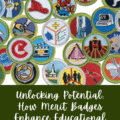Posts on Happily Homegrown contain affiliate links. When you make a purchase through an affiliate link, your price will be the same, but Happily Homegrown will receive a small commission. Thank you for your support!

In a world where education is increasingly dynamic, integrating scout activities into your homeschooling activities is a thrilling way to blend learning with hands-on experiences. Scout activities are not just about tying knots and camping. They’re a treasure trove of life lessons waiting to be explored.
As a Scouting family, with all five of us being registered members of Scouts BSA Troop 3, scout activities regularly take over our calendars. While many families see this strictly as an extracurricular activity, as homeschoolers it is so much more! We use scouting activities as the foundation for many of our homeschooling activities.
Let’s explore how these activities can be seamlessly woven into your homeschooling routines, enriching your child’s educational journey with the values and skills that Scouts BSA embodies.
Why Include Scout Activities in Homeschooling?
Before we explore the ‘how,’ let’s consider the ‘why.’ Scout activities are structured to promote a range of benefits:
- Character Development: Scouting encourages honesty, responsibility, and respect for others and the environment.
- Self-Reliance: Tasks and challenges build confidence and future self-sufficiency.
- Teamwork: Many scout activities emphasize collaboration, leadership, and social skills.
- Physical Health: Outdoor challenges encourage a love for nature and physical fitness, which is essential for a child’s well-being.
Integrating Scout Activities into Daily Learning
Now that we’ve established the importance of scout activities, let’s explore how to incorporate these activities into your everyday homeschooling endeavors.
Creating Balance Between Scout Activities & Learning Goals
Begin by drawing parallels between scouting activities and merit badges with your educational goals. Here are a few ways we integrate them:
- Teach map reading and navigation alongside geography lessons.
- Incorporate environmental science through merit badge topics like sustainability and wildlife.
- Develop math skills by planning a hiking trip with budgeting and distance calculations.
- Utilize rank advancement and merit badges to teach a variety of life skills and check the boxes for academics.
Fostering a Practical Mindset
Scouting is deeply rooted in practical skills. Integrate these by:
- Assigning homesteading chores such as gardening or animal care, providing children with a sense of responsibility and accomplishment. These chores can meet requirements for Nature, Gardening, and Plant Science merit badges.
- Encouraging handicrafts that enhance fine motor skills and creativity. Basketry, Leatherwork, and Woodcarving merit badges have outlines covering safety, how to, and final projects and work well as unit studies.
- Having children plan and prepare meals to learn about nutrition and food waste. This covers requirements for rank, as well as parts of Cooking , Sustainability, and Personal Fitness merit badges.
Developing Life Skills Through Adventure
Scouting’s adventure-based approach to learning is one of its most compelling aspects. To bring this excitement into your homeschool curriculum:
Outdoor Expeditions
Organize regular outdoor excursions that align with your educational themes, such as:
- Field trips to historical sites and parks for social studies.
- Field trips to zoos, botanical gardens, and nature centers for science.
- Nature walks or hiking trails for biology and earth sciences (and of course PE).
Scout-Led Projects
Encourage your children to take on scout-led projects that complement their studies:
- Building birdhouses or planting a garden to support local wildlife and ecosystems.
- Create models to go along with their studies in art and social studies.
- Lead a community clean-up to support local conservation efforts.
Conclusion: The Path Forward
Integrating scout activities into your homeschool day can transform how your children learn, creating a rich, multidimensional educational experience. It’s about teaching life skills that go beyond academics, preparing kids for real-world challenges, and fostering a lifelong love of learning. Remember, scouting is not just an activity; it’s a journey of growth and discovery. Embark on this journey with your children and watch as they develop into well-rounded individuals, ready to take on the world.
Want to know more about Scouting and how to get your children involved?
Visit Be A Scout to find out about Cub Scouts (ages 5-10), Scouts BSA (ages 11-17), Venturing (ages 14-20), Sea Scouts (ages 14-20), and Exploring (ages 10-20) in your community.






 Effective Strategies for Balancing Homemaking and Homeschooling
Effective Strategies for Balancing Homemaking and Homeschooling
Leave a Reply